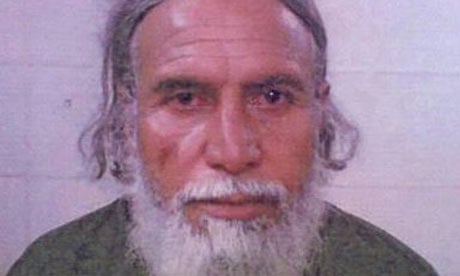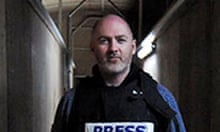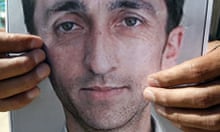The Pakistan army has captured the Swat Taliban spokesman, Muslim Khan – the first arrest of an insurgent leader since the start of a major military offensive in the picturesque northern valley four months ago.
The army spokesman, Major General Athar Abbas, said that Khan and another commander, Mahmood Khan, had been seized. Both had £73,000 bounties on their heads. Three lesser Taliban leaders were also caught.
The arrests took place in the suburbs of Mingora, the main town in Swat, the army said on its website. Alongside the announcement was a photo of a glum-looking Khan, his trademark black turban removed to reveal silver hair.
The announcement came shortly after the News reported that Khan had been engaged in secret peace talks with the government in Islamabad. The interior minister, Rehman Malik, denied the claims.
"There will be no negotiations with the terrorists," he told reporters. "They have no other option. They either get killed or arrested."
The timing of the announcement also elicited speculation that it was intended to coincide with the anniversary of the September 11 attacks in America. Officials in Obama's administration have praised Pakistan for its Swat drive.
However, Khan's capture will have a more immediate impact in the valley itself, where military and provincial authorities are keen to combat fears of a Taliban comeback. The army has managed to clear most of Swat of gunmen since fighting erupted in May, and many of the 1 million people who fled their homes have now returned.
Nevertheless, Pockets of violent resistance persist along the western bank of the river Swat, and the atmosphere in the valley remains anxious. Human rights groups have accused the army of summarily executing suspected militants after bloodied corpses were dumped in the streets.
On 30 August, a suicide bomber killed at least 15 police recruits at a training centre in Mingora, stirring fears of a new campaign of guerrilla violence.
In recent months, some local residents have become bolder in contributing to the defence effort. Up to 8,000 men have joined local lashkars, or village militias, to keep the Taliban at bay, Dawn newspaper reported this week. One such lashkar killed three militants in a confrontation outside a mosque last week.
Tribal elders expect the numbers enrolled in lashkars to double by November.
But the success of the Taliban leadership in evading capture has caused sceptical residents to doubt whether the army is serious about eliminating the insurgency.
Persistent reports of the demise of Shah Doran, one of the most notorious commanders, were never confirmed.
That scepticism may now cease with the arrest of Khan. As spokesman and a senior commander in his own right, he is close to the Taliban leader Mullah Fazlullah.
In an interview with the Guardian last April, Khan explained his vision of forging a global Islamic caliphate. "We want to make a unity of Muslims states, just like the United States of America," he said, speaking as he juggled phone calls at the Taliban headquarters on the banks of the river Swat.
A burly man in a silky, jet-black turban, Khan spoke broken English with an American twang – he worked in Boston as a house-painter and a petrol-pump attendant in the late 1990s.
He defended a group of Taliban fighters for lashing a teenage girl in punishment, a shaky video of which had shocked Pakistanis and would prove instrumental in galvanising public opinion against the militants.
The envisioned Islamic caliphate would have no room for elections, he added. "Democracy is a system of European countries. It is not good for Muslims," he said.


